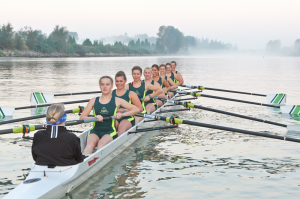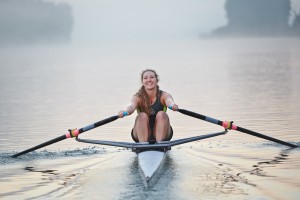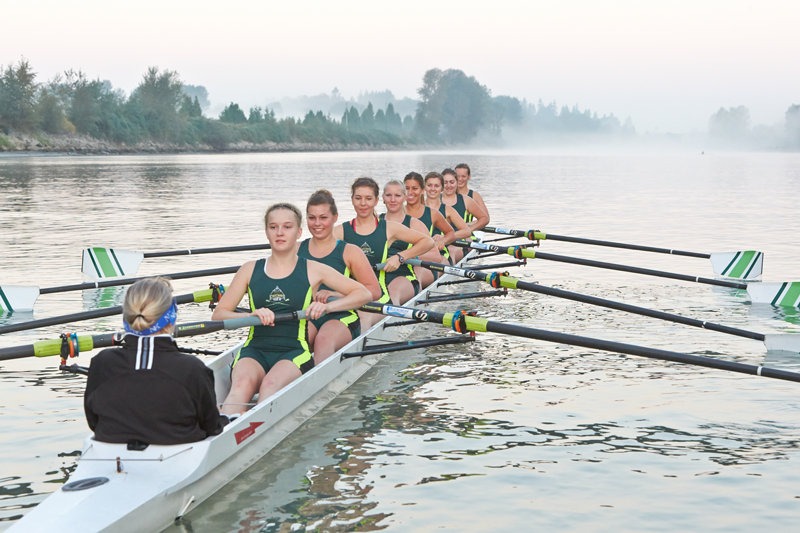Print Edition: October 9, 2013

It’s 7 a.m. in Fort Langley as the dense fog begins to disperse and the sun rises in the east over the small town. I’m standing on a dock overlooking the historic Fraser River without a soul in sight. As I begin to question what I’m doing here, I hear the faint sounds of a man yelling “Row…Row…Row,” urging his teammates on. Squinting into the mist, I see the narrow rowing scull lurch out of the fog as if it were an undiscovered marine species seeking early morning prey.
The Cascades rowing team is partaking in its early morning ritual as the rowers make one of their many runs down the narrow strait. The team is accompanied by a woman in a motorboat who functions both as taskmaster and cheerleader, yelling out instructions and encouragement. She is 13-year head coach Liz Chisholm.
As the fog once again swallows up the team in the distance I can’t help thinking of the interesting bond that must form between teammates as they spend the early hours on the open water sharing effort, energy, success, and failure.
As some time passes, Coach Chisholm returns in her motor boat, but this time accompanying a solo boat that is perhaps going even faster than the first.
The Cascades rowing team participates on a national level and has generally been in the middle of the pack since its inception. The team has been able to participate in the Western Canadian University Rowing Championships (WCURC) in the past. This event, which serves as a gateway for the Canadian Univers

ity Championships, gives the team an opportunity to compete against the largest university rowing programs in Canada.
Coach Chisholm also had praise for her team saying that they have done “very well” as of late and have been able to challenge the bigger programs of schools like the University of Victoria (UVic) and the University of British Columbia (UBC).
However, when questioned about the growth of the sport of rowing Chisholm did have some negative comments concerning the funding and training programs that the bigger schools are offering that are not available to UFV students:
“For the past three years; the national sport governing body has allocated money to national development centers at 10 universities in the country. Those of us who are not linked with a national center have noticed the change in results regionally and nationally.”
Coach Chisholm has a point in saying that the national governing board has overlooked UFV for bigger schools, and that funded schools hold a serious advantage. The UVic Vikings have captured four national championships since they received a national development center just three short years ago.
Is it possible that with the same funding, the UFV program could be as strong as our counterparts on the island? All amateur sports get political at one point or another, particularly on the national level, yet one can’t help but wonder at the potential of the UFV program if it received proper funding.
At least one coach is frustrated by the stacked odds.
However, Chisholm is excited about the future of the program and proud of its history. She praises alumni Lisa Roman and Alex Janzen for their success since their UFV days. Both rowers will be competing for spots on the Canadian National Team with an opportunity to represent Canada in the 2016 Summer Olympics in Rio De Janeiro, Brazil.
The WCURC rowing season kicks off on October 20. The Cascades are expecting to once again challenge for an opportunity to compete in the national championships, where they hope to finally slip from the mist and into the sun.


